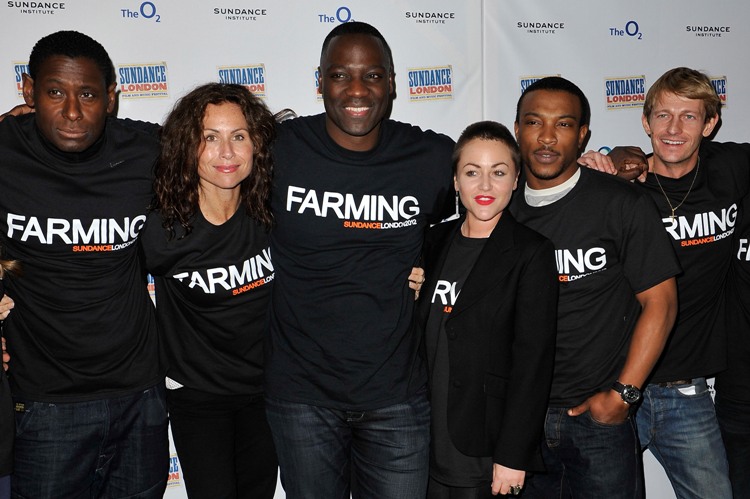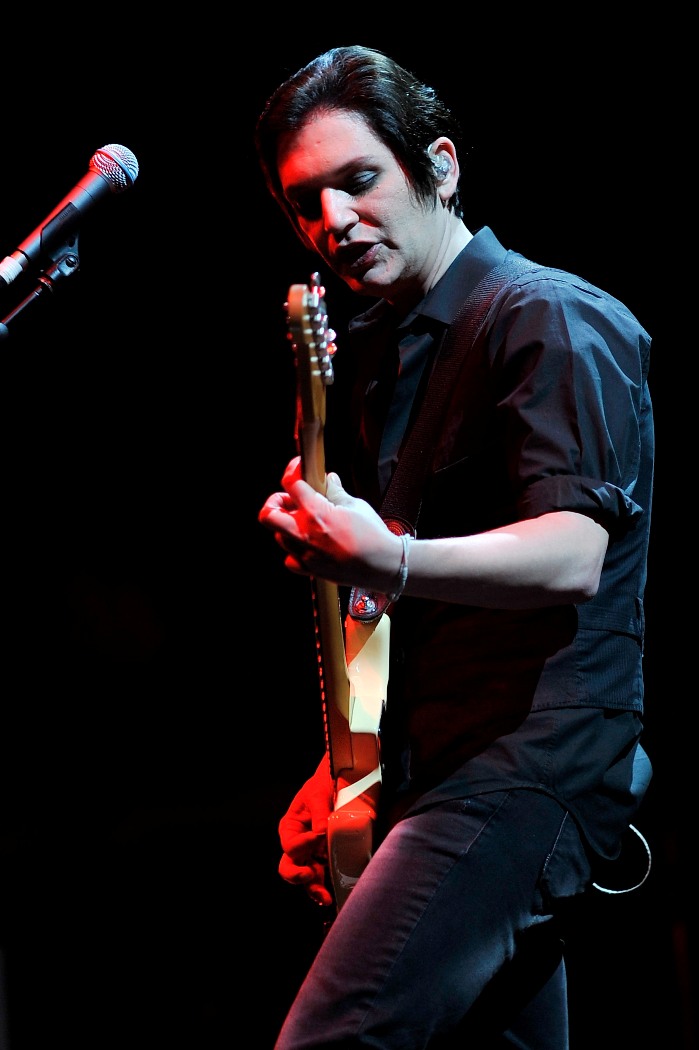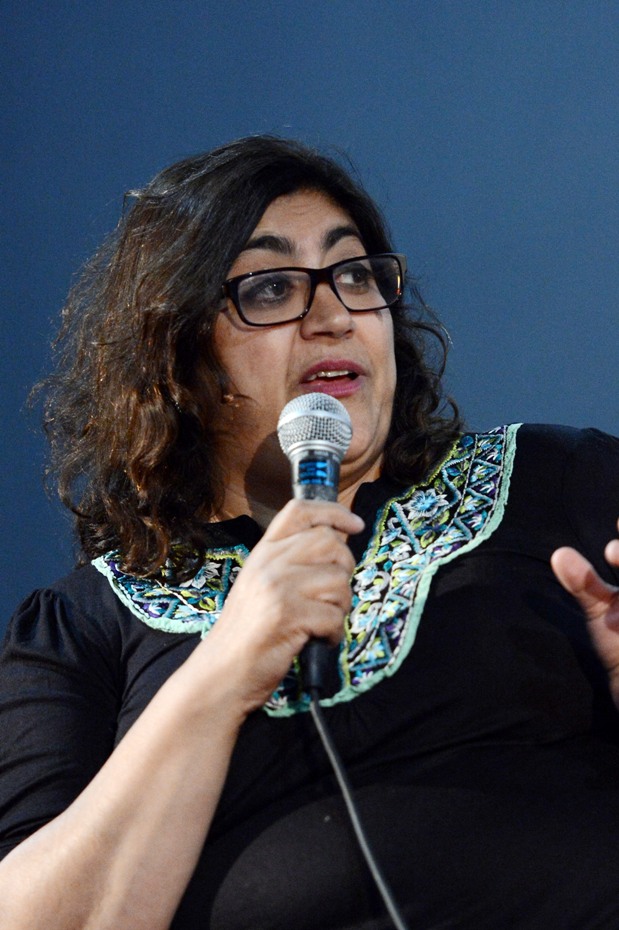theartsdesk at Sundance London | reviews, news & interviews
theartsdesk at Sundance London
theartsdesk at Sundance London
Robert Redford brings a little flavour of snowy Utah to the O2
This weekend Robert Redford and his Sundance Institute are bringing a sort of taster version of the world’s leading showcase for independent (non-studio) English-language films to London.
The other thing that’s hard to replicate is the possibility that you might find yourself in that line or at that bar next to a well-known, dressed-down star or director. But in its first two days Sundance London has already produced a number of surprise guest appearances. Paul Simon turned up unannounced to answer questions after a screening of Under African Skies, a documentary tracing his return to South Africa 25 years after Graceland. A reading of British actor Adowale Akinnuoye-Agbaje’s screenplay for Farming, a drama about Nigerian children farmed out to white working-class couples in the Seventies that was developed in Sundance’s Screenwriting Lab, drew a cast headlined by Minnie Driver, Marc Warren, David Harewood, Ashley Walters and Jaime Winstone (pictured below with Akinnuoye-Agbaje centre).

The Sundance Film Festival has two purposes. One is to let new filmmakers find their audience and give the public the chance to discover new talent (the roll-call of Sundance “discoveries” in the festival’s nearly 35 years includes Quentin Tarantino, Kevin Smith, Darren Aronofsky and Steven Soderbergh, to name just a few) and certainly “part of the reason for the London festival is to make the UK public aware of Sundance films,” said its director of programming, Trevor Groth. The sampling of 14 films drawn from the 2012 crop features a mixture of documentary and narrative, the latter ranging from experimental (An Oversimplification of Her Beauty) to more accessible comedy (Liberal Arts) to actress Julie Delpy’s sequel to Two Days in Paris starring Chris Rock. It also includes the winner for the Best Documentary Prize (The House I Live In, about the drug war) and the screenwriting award (Safety Not Guaranteed).

British films have been shown at Sundance virtually every year, from Four Weddings and a Funeral in 1994 to this year’s Shadow Dancer, and its Lab program has supported the development of numerous British filmmakers such as Andrea Arnold. Three UK directors who have participated in the Festival — Gurinder Chadha (Bend It Like Beckham), James Marsh (Man on Wire) and Sally El Hosaini (My Brother the Devil, a 2012 selection) - debated three US directors of Sundance London selections on a panel called “Thinking Independently: US vs. UK”. Despite the confrontational title, and moments resembling a miserabilist version of the old Saturday Night Live sketch “¿Quién es más macho?” (¿Quién has it tougher? perhaps), both sides proved to have more in common than not. They agreed that (1) with the disappearance of government funding (UK) and the demise of the studio divisions devoted to producing and distributing independents (US), filmmakers have to hustle harder than ever to cobble together production financing; (2) innovations in technology are revolutionising making and distributing films but it’s not clear yet how it’s all going to shake out; (3) they all learned filmmaking without going to film school; (4) don’t give up the day job; and (5) everyone should move to France, where filmmakers get stipends in between projects. Prize for best anecdote goes to Chadha (pictured overleaf, photo by Ian Gavan) for a gleeful account of her response to the late UK Film Council’s declining to fund Beckham: she told them in no uncertain terms she would play the race card and “go to the press saying they wouldn’t fund Asian filmmakers”. She got the money.

However, the original spirit persists. “What’s so interesting,” says Sundance 2012 filmmaker Sheldon Candis, a University of Southern California film school grad whose film Luv, a coming-of-age story starring Danny Glover and Common, is showing at the O2, “is you get Will Ferrell coming with a film that he produced [The Bachelorette] and you still get a kid who made a feature for $20,000 on his laptop. Or you get Frank Langella in this big movie, Robot and Frank, and you get people like me. I had names in my movie but I paid them $2 and a turkey sandwich. That’s the great thing about it all.” (Pictured below: Tricky and Marina Topley-Bird perform)

You might not get to meet Bob himself, but for the moment Sundance London has offered a unique opportunity to meet US filmmakers, or the British talent of tomorrow, informally after a screening or in the Inc Club bar, as well as to see some of the most interesting work not likely to be playing at a multiplex near you.
- Sundance London concludes today
- All images courtesy of Getty Images
Explore topics
Share this article
The future of Arts Journalism
You can stop theartsdesk.com closing!
We urgently need financing to survive. Our fundraising drive has thus far raised £49,000 but we need to reach £100,000 or we will be forced to close. Please contribute here: https://gofund.me/c3f6033d
And if you can forward this information to anyone who might assist, we’d be grateful.

Subscribe to theartsdesk.com
Thank you for continuing to read our work on theartsdesk.com. For unlimited access to every article in its entirety, including our archive of more than 15,000 pieces, we're asking for £5 per month or £40 per year. We feel it's a very good deal, and hope you do too.
To take a subscription now simply click here.
And if you're looking for that extra gift for a friend or family member, why not treat them to a theartsdesk.com gift subscription?
more Film
 Blu-Ray: The Man in the White Suit
Ealing Studios' prescient black comedy, as sharp as ever
Blu-Ray: The Man in the White Suit
Ealing Studios' prescient black comedy, as sharp as ever
 The Woman in Cabin 10 review - Scandi noir meets Agatha Christie on a superyacht
Reason goes overboard on a seagoing mystery thriller
The Woman in Cabin 10 review - Scandi noir meets Agatha Christie on a superyacht
Reason goes overboard on a seagoing mystery thriller
 London Film Festival 2025 - crime, punishment, pop stars and shrinks
Daniel Craig investigates, Jodie Foster speaks French and Colin Farrell has a gambling habit
London Film Festival 2025 - crime, punishment, pop stars and shrinks
Daniel Craig investigates, Jodie Foster speaks French and Colin Farrell has a gambling habit
 I Swear review - taking stock of Tourette's
A sharp and moving tale of cuss-words and tics
I Swear review - taking stock of Tourette's
A sharp and moving tale of cuss-words and tics
 A House of Dynamite review - the final countdown
Kathryn Bigelow's cautionary tale sets the nuclear clock ticking again
A House of Dynamite review - the final countdown
Kathryn Bigelow's cautionary tale sets the nuclear clock ticking again
 theartsdesk Q&A: Idris Elba on playing a US President faced with a missile crisis in 'A House of Dynamite'
The star talks about Presidential decision-making when millions of lives are imperilled
theartsdesk Q&A: Idris Elba on playing a US President faced with a missile crisis in 'A House of Dynamite'
The star talks about Presidential decision-making when millions of lives are imperilled
 Urchin review - superb homeless drama
Frank Dillane gives a star-making turn in Harris Dickinson’s impressive directorial debut
Urchin review - superb homeless drama
Frank Dillane gives a star-making turn in Harris Dickinson’s impressive directorial debut
 Mr Blake at Your Service review - John Malkovich in unlikely role as an English butler
Weird comedy directed by novelist Gilles Legardinier
Mr Blake at Your Service review - John Malkovich in unlikely role as an English butler
Weird comedy directed by novelist Gilles Legardinier
 Don't Let's Go to the Dogs Tonight review - vivid adaptation of a memoir about a Rhodesian childhood
Embeth Davidtz delivers an impressive directing debut and an exceptional child star
Don't Let's Go to the Dogs Tonight review - vivid adaptation of a memoir about a Rhodesian childhood
Embeth Davidtz delivers an impressive directing debut and an exceptional child star
 One Battle After Another review - Paul Thomas Anderson satirises America's culture wars
Leonardo DiCaprio, Teyana Taylor, and Sean Penn star in a rollercoasting political thriller
One Battle After Another review - Paul Thomas Anderson satirises America's culture wars
Leonardo DiCaprio, Teyana Taylor, and Sean Penn star in a rollercoasting political thriller
 Steve review - educator in crisis
Cillian Murphy excels as a troubled headmaster working with delinquent boys
Steve review - educator in crisis
Cillian Murphy excels as a troubled headmaster working with delinquent boys

Add comment